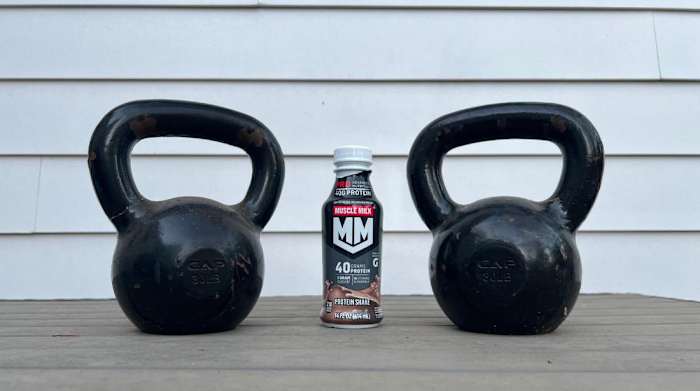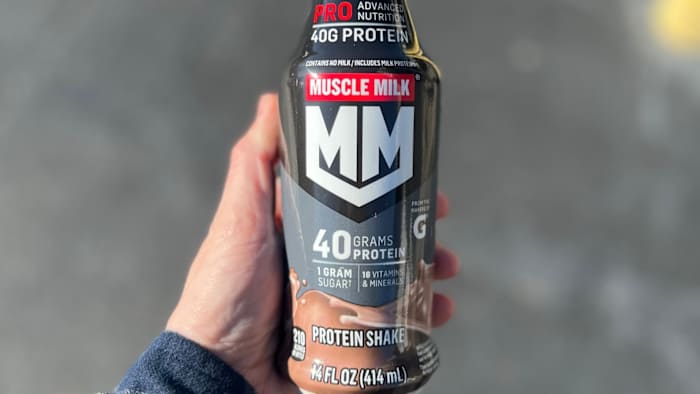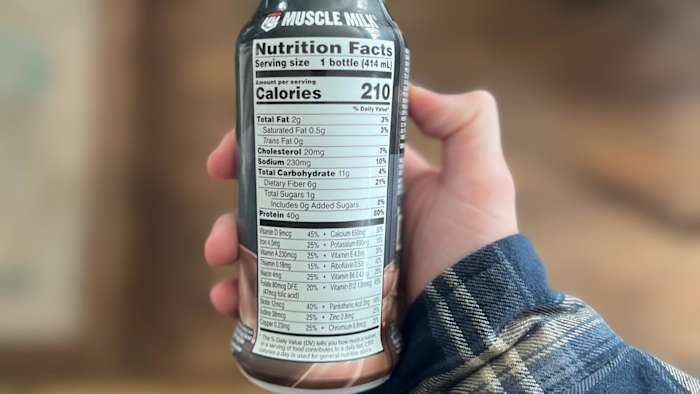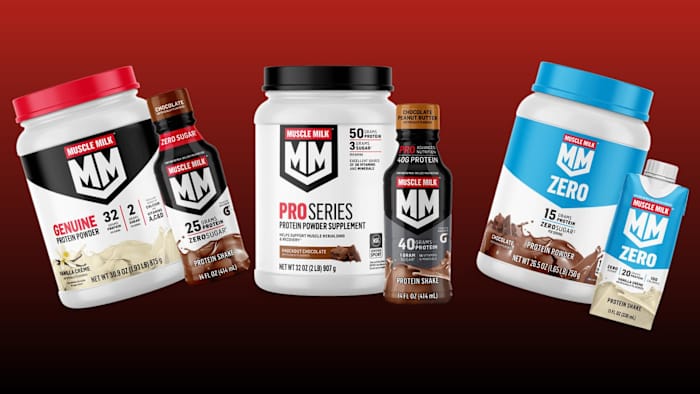Muscle Milk Review (2024): Are These Protein Shakes Right for You?
The products featured in this article have been independently reviewed. When you buy something through the retail links on this page, we may earn commission at no cost to you, the reader. The Sports Illustrated editorial team is not involved in the creation of this content. Learn more here.
Protein supplements are one of the most popular dietary supplements on the market. If you’re a wellness junkie like me, it's likely nearly everyone in your circle has protein powder or protein drinks stocked at their house. In fact, If you look in my cabinet, you’ll find a few different brands of protein powder, a couple of strong pre-workouts and a handful of other supplements from multivitamins to electrolyte powders.
Up until recently, my go-to protein supplement was protein powder because I could mix it with water and have 30+ grams of protein with little impact on my calories, carbs or fat content. But my approach to supplements had to change when I found out I have a condition that makes it difficult for my body to absorb nutrients from food. That’s when I started trying protein shakes.
Muscle Milk shakes are one of the first I tried. Muscle Milk makes a few different lines of protein shakes with different nutritional content, but the key ingredients in their formulas are the same. For this Muscle Milk protein shake review, I’ll talk about all of the different products, but I have only personally tested the Pro Advanced series. Spoiler: I loved them.
This content is meant to be informative, but should not be taken as medical advice. It is not intended for use as diagnosis, prevention or treatment of health problems. Always speak with your doctor before starting any new supplement or exercise regimen.
Muscle Milk Protein Shakes At a Glance
- Muscle Milk offers three different protein shakes: Genuine, Pro Advanced and Zero with 25 grams of protein (Genuine), 32-40 grams of protein (Pro Advanced) and 20 grams of protein (Zero)
- All Muscle Milk shakes have two grams of sugar or less with zero grams of added sugar
- Muscle Milk shakes are priced about $1 less than the other comparable brands at $2.18 per bottle for Genuine, $2.40-$3.75 per bottle for Pro Advanced and $2.20 per bottle for Zero shakes
- The Pro Advanced series has a very creamy texture and tastes delicious
Muscle Milk Protein Shake Pros
- Between 20 and 40 grams of protein per bottle depending on which line of shakes you choose
- 16 vitamins and minerals included in amounts between 15-40 percent of your Daily Value (DV)
- About $1 cheaper per bottle than major competitors
- Delicious taste and smooth, creamy texture
Muscle Milk Protein Shake Cons
- Some variation in nutrition depending on flavors (for example, 210 calories per bottle in Pro Advanced Chocolate Peanut Butter vs. 170 calories in Pro Advanced Chocolate)
- A common complaint among reviewers is the high calorie-to-protein ratio compared to other shakes
Muscle Milk Protein Shake Claims
According to Muscle Milk, its protein shakes can help you in two areas: curbing hunger and building muscle. Muscle Milk shakes have between 20 (Zero) and 40 (Pro Advanced) grams of protein per bottle, which can help you get to the 1.6 to 2.2 grams of protein per kilogram of bodyweight range that is optimal for muscle growth if you’re working out (1).
Quality of Ingredients
Milk Protein Isolate
The primary ingredient in Muscle Milk shakes is milk protein isolate. Milk protein isolate is taken from cow’s milk, similar to whey and casein protein. Simply put, milk protein isolate is a complete protein that contains both casein and whey together. Research shows that milk protein isolate is absorbed at a similar rate as whey protein, and the muscle-building benefits are almost identical for middle-aged men (2).
All protein-based Muscle Milk products use milk protein isolate as the primary ingredient. Because milk protein isolate is easier to process than whey isolates, Muscle Milk is able to offer higher protein content for lower prices than competitors who use whey protein isolate.
Calcium
The Muscle Milk Pro series (also called Pro Advanced) I tested also contains 520 milligrams of calcium, a little over 50 percent of the recommended daily intake (RDA) of 1,000 milligrams for adults ages 19-50 (3). This is almost double the calcium content you’ll find in premium whey protein powders like Xwerks Grow (210 micrograms), and it is over double the calcium content in most of the best multivitamins.
Muscle Milk is able to offer this much calcium in the protein shakes because of the milk protein isolate and an additional ingredient called calcium caseinate. Calcium caseinate is one of three types of calcium you can find in cow’s milk (4), and all three Muscle Milk shake lines use the extract to enrich the shakes (Genuine and Zero have 330 milligrams and 280 milligrams, respectively).
Vitamins and minerals
All of the Muscle Milk shake options are fortified with essential vitamins and minerals. I was very impressed with the Pro Advanced formula—the most fortified with 16 vitamins and minerals in doses between 15 and 40 percent DV. These nutrients include vitamin D, calcium, iron, vitamin A, vitamin E, vitamin C, riboflavin, vitamin B6, thiamin (eight percent DV), vitamin B12, niacin, folate, pantothenic acid, biotin, iodine, zinc, chromium and copper.
The Genuine series protein shakes have eight vitamins and minerals including vitamin D, calcium, potassium, iron, magnesium and phosphorus.
The Zero protein shakes have six vitamins and minerals including vitamin D, vitamin A, vitamin C, iron, calcium and potassium.
Other ingredients
Sucralose. All Muscle Milk shakes are sweetened with sucralose. Sucralose is an artificial sweetener that has zero calories and no nutritional impact (5). There is much information online about sucralose and its negative side effects. However, a review of the literature about sucralose found no evidence sucralose is toxic or that it affects your gut function or glycemic index, and also showed your body absorbs very little of it from any source (6).
Bottom line: if you are uncomfortable consuming sucralose for any reason, Muscle Milk shakes are not a good option for you.
High-oleic sunflower oil. When I saw high-oleic sunflower oil on the ingredients list for Muscle Milk protein shakes, I immediately considered stopping my test because I had heard about the potential negatives of sunflower oil like increased risk for heart disease, inflammation and weight gain. However, I reached out to Pete Nastasi, certified nutrition coach with N2 Nutrition, to get his expert opinion on this ingredient.
Nastasi says high-oleic sunflower oil is “a monounsaturated fatty acid that has a long shelf life and helps improve the product's resistance to oxidation. It helps to contribute to a smoother texture and overall palatability of a protein shake. In my opinion, especially in the amount that’s likely within the shake, there is nothing harmful about this ingredient, it just may add a few extra calories.”
My own research seemed to confirm this. According to the National Institute of Health, high-oleic sunflower oil has beneficial fatty acids and amino acids (7). It appears most of the risks of using sunflower oil are associated with cooking because it has a low smoke point at about 180 degrees Fahrenheit (8) and over-consumption of omega-6 fatty acids (9).
Artificial flavors. According to the nutrition label, Muscle Milk shakes include “natural and artificial flavors.” These artificial flavors are not stated on the label, which is problematic in my opinion. I did a fair amount of searching to see if I could find what exactly these artificial flavors are, but turned up no results. Artificial flavors are flavors that are reproduced in a lab. Some of these flavors have the same chemical makeup as their natural counterparts while others are different to varying degrees (10).
Nutrition Facts
I really like the macronutrient content of Muscle Milk protein shakes, particularly the Pro Advanced formula. There is a good balance of calories, high protein content and a handful of carbs that make these shakes ideal for bulking, post-workout recovery or filling nutritional gaps due to illness or malnutrition.
Genuine formula:
| Calories | Protein (grams) | Carbohydrates (grams) | Fat (grams) | Sugar (grams) |
|---|---|---|---|---|
160-180 | 25 | 7-10 | 4.5-5 | 0-1 |
Pro Advanced formula:
| Calories | Protein (grams) | Carbohydrates (grams) | Fat (grams) | Sugar (grams) |
|---|---|---|---|---|
170-210 | 32-40 | 8-11 | 2-2.5 | 0-1 |
Zero formula:
| Calories | Protein (grams) | Carbohydrates (grams) | Fat (grams) | Sugar (grams) |
|---|---|---|---|---|
100 | 20 | 6-7 | 1 | 0 |
My Experience Using Muscle Milk Protein Shakes
When I tried the Pro Advanced series Chocolate Peanut Butter shakes, my goal was to test how I felt in different scenarios. I tested these shakes as meal replacements, snacks and post-workout supplements to see how my body reacted to the nutrients. I had 12 shakes, and I drank one per day in the different scenarios below.
Meal replacement
Full disclosure, weight loss is the opposite of my goal, so I can’t particularly speak to how effective Muscle Milk shakes are for weight loss. However, I did try these as a sort of meal replacement at different times throughout the day. If you’re looking for a true meal replacement shake you may want to consider 310 Shakes or something similar.
For four days, I woke up and drank a protein shake instead of eating breakfast. Breakfast is usually one of my biggest meals because I wake up hungry. I’ve used protein powders in smoothies or in shaker bottles as breakfast replacements before, so I was expecting a similar experience. However, I was very satiated by the Pro Advanced shakes. I felt energized and even skipped my morning caffeine both of these days because I felt alert.
Related Post: Meal Replacements vs Protein Shakes: Why The Differences Matters
Snacks
For another four days, I used the Muscle Milk shakes as mid-afternoon snacks. I regularly have a mid-afternoon lull where I'm tempted to grab an energy drink or cup of coffee to power through, but objectively I know a healthy, high-protein snack would be the best option in those moments. I decided to use these shakes as that protein supplement, and they worked. With these shakes, I didn’t feel the need to drink caffeine for a pick-me-up to stay focused and energized between lunch and dinner.
Post-workout
For the final four days, I drank a shake within an hour after my workout. Most people who use protein supplements are likely aiming for muscle growth. I have tried and tested dozens of powders, shakes and bars as a way to build muscle and maintain weight gains, but I didn’t test these long enough to give you data on how Muscle Milk affects muscle mass.
That said, here’s what I can tell you: I was less sore after my workouts when I drank these shakes, and the following day in the gym I felt more ready to attack my workout than I typically do. If I had to pinpoint the difference, I would say it would be in the macros. Muscle Milk shakes are more than just a high-protein supplement; they have a fair amount of other macros compared to what you would typically find in even the best protein powders.
In addition to the 40 grams of protein, the Chocolate Peanut Butter flavor has 11 grams of carbohydrates. Traditionally, high-protein, low-carb supplements have been my go-to, but that’s because I didn’t understand how important carbohydrates were to replenish energy stores in the muscle after exercise and speed up recovery (11). They also have 210 calories, which can fill any gaps I was having from chaotic days where I ate a lower-calorie breakfast or lunch than normal.
Muscle Milk Protein Shake Flavors
- Muscle Milk Genuine Protein Shakes: Chocolate, Strawberry and Vanilla
- Muscle Milk Pro Advanced: Chocolate Peanut Butter, Knockout Chocolate, Intense Vanilla and Slammin’ Strawberry (40 grams of protein each); Chocolate, Vanilla and Cookies and Cream (32 grams of protein each)
- Muscle Milk Zero: Chocolate and Vanilla
Muscle Milk Protein Shake Cost
The price of your muscle milk shakes depends on what line and flavor you choose. The Genuine shakes come in a 12-pack that costs $26.49 for Chocolate, $25.17 for Strawberry and $24.32 for Vanilla. That’s about $2.18 per bottle on average.
The Pro Advanced series is slightly more expensive at $28.89 for the Vanilla and Chocolate flavors, $27.45 for the Cookies and Cream, $47.00 for Chocolate Peanut Butter, $47.76 for Knockout Chocolate, $46.54 for Slammin’ Strawberry and $45.37 for Intense Vanilla. That is an average of $2.37 per bottle for the flavors with 32 grams of protein and $3.89 for the flavors with 40 grams of protein.
The Zero series is $26.49 for both the Vanilla and Chocolate flavors, which is an average of $2.20 per bottle.
Who Should Use Muscle Milk Protein Shakes
- Those who are trying to bulk up and/or build muscle. These shakes, especially the Pro Advanced series, are packed with high-quality protein, carbohydrates and a good amount of calories that can help achieve a calorie surplus
- People trying to gain or maintain weight for other health reasons. Anecdotally, I have a disease that keeps my body from efficiently absorbing nutrients from food, and I plan to use these shakes to help fill those gaps
Always consult your doctor before taking any dietary supplements, particularly if you’re trying to fill nutritional gaps from illness or malnutrition.
Who Should NOT Use Muscle Milk Protein Shakes
- Those looking for a high-protein, low-calorie supplement. These shakes have varying amounts of protein, but they also have a higher impact on your other macros than protein powders and some other shakes.
- Anyone looking for a meal replacement to help them lose weight. These shakes don't have enough nutritional value to be full meal replacements in my opinion.
What Customers Are Saying About Muscle Milk Protein Shakes
All of the flavors in the Muscle Milk Pro Advanced series have more than 6,000 reviews and the average rating is 4.5/5 stars. Common themes among these reviews across all flavors are great taste, high protein content and quality nutrient content. On the other hand, a very common complaint among positive and negative reviews is an upset stomach with symptoms like diarrhea, gas and bloating.
I didn’t have any symptoms of an upset stomach whether I drank the shake over the course of 20-30 minutes or whether I chugged it running out the door to get to work. If protein supplements typically upset your stomach, then you may experience those negatives with these shakes as well.
About Muscle Milk
Muscle Milk was founded in 2000 and was then bought by Gatorade in 2019. According to the company website, Muscle Milk powder products are NSF-Certified for Sport, which means they’ve been tested for banned substances. That certification does not seem to apply to the protein shakes discussed here, but being owned by Gatorade comes with the advantage of having access to the Gatorade Sports Science Institute that is “committed to helping athletes optimize their health and performance.”
Muscle Milk vs. Premier Protein
If you’ve tried protein shakes before, you’ve likely tried Premier Protein. Premier is one of the most recognizable protein shake brands that you can find in most stores anywhere you are. I’ve tried several flavors of Premier Protein shakes. Here is a comparison of Premier Protein shakes and Muscle Milk in my experience:
Nutrition. The standard Premier Protein shake has 30 grams of protein per serving compared to Muscle Milk’s 25 (Genuine). I compare those two products because they are the closest in price, however, the Muscle Milk Pro Advanced series has much more protein and very comparable nutritional value to Premier Protein shakes. Pro Advanced is just more expensive.
Taste. Honestly, it is difficult to beat Premier Protein’s taste. They have an exceptionally large selection of flavors that include holiday flavors like Winter Mint, Pumpkin Spice and others to go along with a variety of standard flavors like Caramel Macchiato. Muscle Milk flavors taste delicious, but they’re far more plain than Premier Protein.
Cost. You can get 12 Premier Protein shakes for about $2.37 per bottle, which is about $0.20 more per bottle than the Muscle Milk Genuine series and identical to the cost of the three Pro Advanced series flavors that have 32 grams of protein.
Muscle Milk vs. FairLife Core Power
Up front, I’ll say that I am biased in this comparison because FairLife shakes are my favorite protein shake. However, I was surprised by how well the Muscle Milk Pro Advanced compared in quality, taste and cost.
Nutrition. FairLife only has 26 grams of protein per bottle compared to 25 in Muscle Milk Genuine and 32-40 in Muscle Milk Pro Advanced. However, keep in mind that FairLife is made with lactose-free milk, so from a nutrition standpoint it is designed for those with lactose sensitivities or allergies.
Taste. FairLife and Muscle Milk both offer a creamy, rich taste. They have comparable smooth and creamy textures in all of the flavors I have tried. I don’t think either one of these shakes beats the other in taste.
Cost. Fairlife Core Power is about $2.83 per bottle, which is about $0.70 more expensive than the Muscle Milk Genuine series, and $0.50 more per bottle than the Pro Advanced Series flavors with only 32 grams of protein.
Muscle Milk Protein Shakes vs. Shakeology
I’ve never tried Shakeology, but we asked registered dietitians to weigh in on the ingredients and claims.
Nutrition. One of Shakeology’s main claims is that it is “more than just a protein shake” which certainly holds true. The formula includes ashwagandha, prebiotic fibers, cinnamon, matcha green tea, mushrooms and other “superfood” ingredients. This delivers a nutrient profile that other protein shakes like Muscle Milk won’t be able to match. However, Shakeology only has 16-17 grams of protein per serving, so really these shakes are for different purposes.
Taste. Shakeology comes in dessert-inspired flavors that are rich and sweet according to reviewers. This also comes with a higher sugar content—around seven grams per serving compared to zero to one grams per serving in Muscle Milk shakes. However, Shakeology does not use artificial sweeteners like sucralose, which will appeal to some customers.
Cost. Shakeology is quite a bit more expensive than Muscle Milk shakes, or really any other comparable protein shakes for that matter. Shakeology costs $4.33 per serving at the best price compared to between $2.00 and $3.00 for protein shakes similar to Muscle Milk.
Muscle Milk Protein Shake FAQs
Does Muscle Milk actually help you gain muscle?
Muscle Milk shakes can help you gain muscle if you use them as a way to increase your protein intake alongside resistance training. Remember, the optimal protein intake to build muscle is between 1.6 and 2.2 grams per kilogram of body weight (1). In that sense, Muscle Milk shakes can net you an additional 25-40 grams of protein per day to push you to that number if your diet alone doesn’t provide enough protein.
Related Post: Drinking Protein Shakes Before Bed for Muscle Recovery and Growth
Are the Muscle Milk protein shakes actually good for you?
It is difficult to say whether Muscle Milk shakes are “good for you” because it depends on your goals and health. If your goal is to build muscle, fill some macronutrient gaps in your diet or maintain/add weight, then Muscle Milk shakes can help you accomplish that. Eating whole foods with a good micronutrient profile would be your best bet if you are concerned about whole-body health.
Is it okay to drink Muscle Milk protein shakes every day?
Although it's pretty rare to experience side effects from protein shakes, It's usually best to consume your daily macro and micronutrients through a balanced diet and whole foods, rather than relying on shakes in general. However, it is always best to consult your doctor before taking any dietary supplement. If you do experience bloating, excessive gas or other gastrointestinal symptoms after drinking a Muscle Milk shake, stop using them immediately and talk to your doctor.
Is Muscle Milk good for weight loss?
Muscle Milk shakes may be a part of a well-rounded weight loss program, but using them as meal replacements to achieve a calorie deficit is not their intended use. If you are interested in losing weight, it is best to consult your doctor or a registered dietitian to develop a sustainable, healthy plan for you.
Takeaway: Is Muscle Milk Worth It?
Muscle Milk shakes are worth the cost if your goal is to build muscle or fill macronutrient gaps in your diet. These shakes are made with milk protein isolate—which is a good source of protein provided you’re not lactose intolerant or vegan—they’re high in calcium, taste delicious and the cost is comparable to other protein drinks that offer the same nutritional value.
These statements have not been evaluated by the Food and Drug Administration. This product is not intended to diagnose, treat, cure, or prevent any diseases.
Prices are accurate and items in stock as of publish time.
Additional Contributors
- Pete Nastasi: Nastasi is a certified sports nutrition coach, certified weight loss practitioner and personal trainer.
References:
- Stokes, Tanner, et al. “Recent Perspectives Regarding the Role of Dietary Protein for the Promotion of Muscle Hypertrophy with Resistance Exercise Training.” Nutrients, vol. 10, no. 2, 7 Feb. 2018, p. 180, www.mdpi.com/2072-6643/10/2/180/pdf, https://doi.org/10.3390/nu10020180.
- Mitchell, Cameron, et al. “Consumption of Milk Protein or Whey Protein Results in a Similar Increase in Muscle Protein Synthesis in Middle Aged Men.” Nutrients, vol. 7, no. 10, 21 Oct. 2015, pp. 8685–8699, https://doi.org/10.3390/nu7105420.
- National Institutes of Health. “Office of Dietary Supplements - Calcium.” Nih.gov, 6 Oct. 2022, ods.od.nih.gov/factsheets/Calcium-HealthProfessional/.
- Aoe, Seiichiro. “[Milk, Daily Products and Bone Health.Characteristics of Calcium in Milk.].” Clinical Calcium, vol. 28, no. 4, 2018, pp. 493–498, pubmed.ncbi.nlm.nih.gov/29593135/.
- AlDeeb, Omar A.A., et al. “Sucralose.” Profiles of Drug Substances, Excipients and Related Methodology, 2013, pp. 423–462, https://doi.org/10.1016/b978-0-12-407691-4.00010-1.
- Magnuson, Bernadene A., et al. “Critical Review of the Current Literature on the Safety of Sucralose.” Food and Chemical Toxicology, vol. 106, Aug. 2017, pp. 324–355, https://doi.org/10.1016/j.fct.2017.05.047.
- Petraru, Ancuţa, et al. “Nutritional Characteristics Assessment of Sunflower Seeds, Oil and Cake. Perspective of Using Sunflower Oilcakes as a Functional Ingredient.” Plants, vol. 10, no. 11, 17 Nov. 2021, p. 2487, https://doi.org/10.3390/plants10112487.
- Ramroudi, Fereshteh, et al. “Investigation of the Physicochemical Properties of Vegetable Oils Blended with Sesame Oil and Their Oxidative Stability during Frying.” International Journal of Food Science, vol. 2022, 30 Mar. 2022, pp. 1–8, https://doi.org/10.1155/2022/3165512.
- Mariamenatu, Abeba Haile, and Emebet Mohammed Abdu. “Overconsumption of Omega-6 Polyunsaturated Fatty Acids (PUFAs) versus Deficiency of Omega-3 PUFAs in Modern-Day Diets: The Disturbing Factor for Their “Balanced Antagonistic Metabolic Functions” in the Human Body.” Journal of Lipids, vol. 2021, no. 1, 17 Mar. 2021, pp. 1–15, https://doi.org/10.1155/2021/8848161.
- “Natural and Artificial Flavors – Nutritional Sciences.” Nutrisci.wisc.edu, nutrisci.wisc.edu/2021/07/26/natural-and-artificial-flavors/.
- Poole, Chris, et al. “The Role of Post-Exercise Nutrient Administration on Muscle Protein Synthesis and Glycogen Synthesis.” Journal of Sports Science & Medicine, vol. 9, no. 3, 1 Sept. 2010, pp. 354–363, www.ncbi.nlm.nih.gov/pmc/articles/PMC3761704/.












